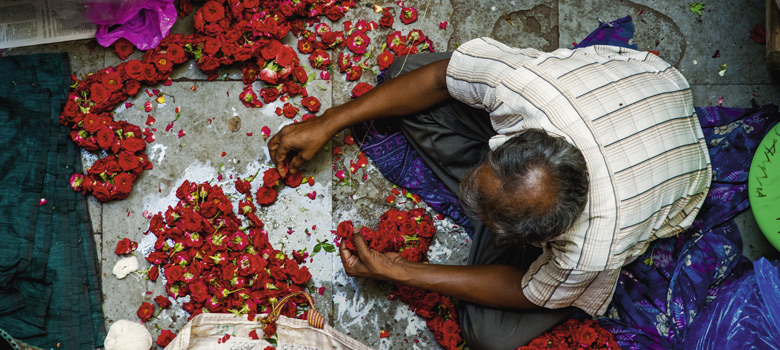
Life
Diverse flavours, common passion
Standing in the Krishna Rajendra Flower Market in the southern Indian capital of Bangalore is the ultimate assault to the senses. On entry, we’re greeted by rows of stalls selling rangoli, a ceremonial powder shaped into neat conical towers of almost alarming colour, which are used to make patterns around Hindu homes.
In the main flower hall, the aromas are heady from the wash of huge wicker baskets overflowing with marigolds, roses, jasmine, carnations and chrysanthemums. Flowers play a huge role in Indian culture, from weddings to Hindu ceremonies and importantly, the garlanding of guests to honour their presence.
Vendors de-stem flowers to be sold by the kilogram, while others string blossoms onto long lengths, sold by the metre. Negotiations and transactions are underway across the hall, but the atmosphere is light and good humoured, as if everyone can’t help but be happy surrounded by this sea of flowers.
This is day one of a small group tour hosted by Australian company the Travel Insider and Marvel Tours, a small Keralan travel company with a focus on responsible tourism. Over the next nine days, we’ll be traversing the southern states of Karnataka, Kerala and Tamil Nadu by private bus, staying in locally run guesthouses and smaller boutique hotels.
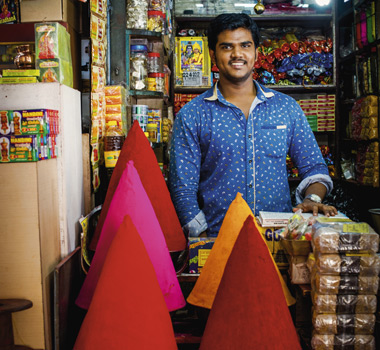
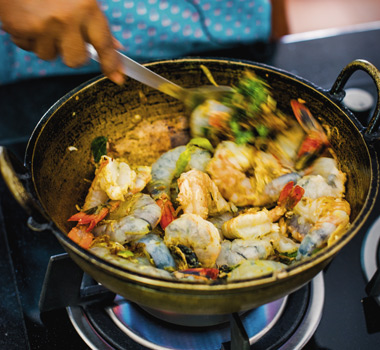
The colour continues at our next stop, as our driver, Jijo, pulls up outside a bright yellow house. While there’s no sign, Jijo assures us we’ve arrived at the Bengaluru Oota Company. Situated in the area of Cambridge Layout, this catering company was founded by friends Divya Prabhakar and Vishal Shetty.
Divya hails from the Gowda of Karnataka’s inland areas, while Vishal’s family are Mangalorean from the state’s coast and they use the Bengaluru Oota Company to honour and celebrate the food cultures of their family backgrounds.
As they regale us with the story of how they swapped high-flying corporate careers to return to their roots, Divya and Vishal hand out ginger and herb buttermilk before we head into the tasting room.
“Our menu includes closely guarded family recipes, literally coaxed from mothers, grandmothers and aunts”, Divya tells us as she serves each dish thali style on large banana leaves. Before long, there’s an edible kaleidoscope before us, including lamb biryani, chicken koli saru, a kosambi salad of cucumber and coconut with mung dahl, a fermented rice pancake, potato croquettes, a green chili and salt raita and a pomegranate jeweled curd rice called a thayir sadam. Finishing off our waistlines is a delicious gulab jamun made to a recipe from Divya’s family, served with South Indian filter coffee.
a regal destination
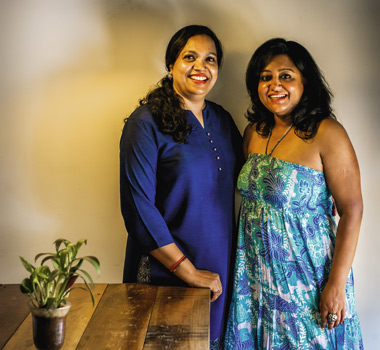
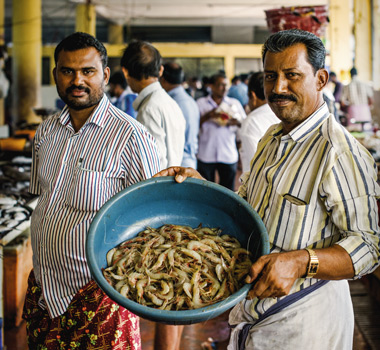
While Divya and Vishal’s meal was fit for a king, an evening visit to Mysore in the state of Karnataka sees us in the most royal of Indian cities. Home to not one, but seven palaces, its namesake palace is India’s second most visited attraction after the Taj Mahal. This is thanks, in part, to the over ‘one lakh’, or 100,000 light globes that illuminate the entire façade, creating a magical fairground atmosphere. Only for half an hour at a time, though, due to the enormous electricity cost!
The royal theme continues with our next host, the charming Yamuna Achaiah, who greets us wearing a glamorous red and gold sari draped in a way unique to her culture – a minority ethnic group, the Kodavas of Coorg, near Mysore.
“I come from a small, vanishing tribal culture and we consist of only around 150,000 people,” Yamuna explains. “We really don’t know where we came from, but some anthropologists have concluded we most likely came into India with Alexander the Great’s second invasion.”
In an open pavilion next to the bungalow guesthouse she runs with her husband, we are treated to 12 courses of Kodava cuisine. Pork features strongly as the Kodavans were once a martial hunting race and wild boar was the main prize. The most famous dish, the deliciously tangy Pandi curry, is cooked slowly over four hours – so the pork melts in your mouth – and is served with light and fluffy fermented coconut rice cake called a thaliaputtu. There’s also a chicken curry served with the noodle-like noolputtu, and various vegetable dishes, including fried eggplant and a cold white pumpkin and yoghurt curry.
Yamuna and her staff begin preparing a meal such as this two days earlier, soaking and fermenting ingredients, as creating each meal from scratch is crucial to preserving Kodava traditions.
“I feel that in some small way, myself and my family are ambassadors of Kodava culture,” Yamuna tells us as we’re served filter coffee and Mysore Pak, the famous fudge-like sweet made from ghee, sugar and gram flour and variously flavoured with cardamom, rose and honey. “What we want to share with our guests is the warmth and soul of India and Kodava culture in a very genuine way.”
After 12 courses and a few too many pieces of Mysore Pak, I’m genuinely feeling that warmth.
Coastal spice
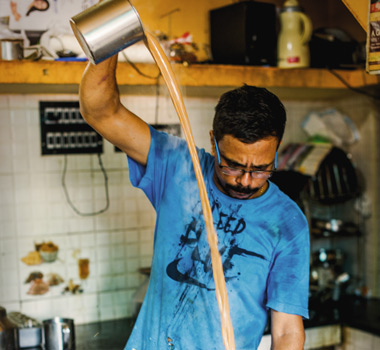
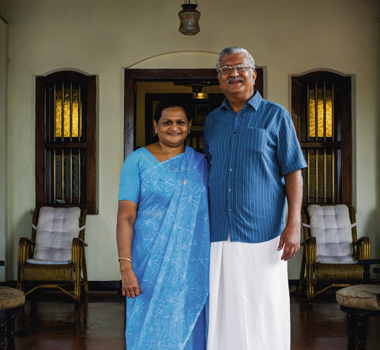
C.P. Moosa strikes a commanding figure as he leads us on a walk around his hometown, the historic spice-trading port of Thalassery. With his tall frame dressed in a yellow business shirt, a gold-rimmed traditional white dhoti and leather sandals, Moosa’s bellowing voice and patrician air only add to his presence. The son of a planter, Moosa is known and respected by all in the distinctly Arab influenced city along the Malabar Coast in northern Kerala.
Trade of spices, especially pepper, flourished at Thalassery with Arab, Jewish and Chinese traders for centuries before the Portuguese, Dutch and, eventually, the British sailed into town. Moosa and his wife, Faiza, are descended from those early Arabs, who made their way across the Arabian Sea to Kerala as early as the 6th Century. As an ethnic group, they’re known as the Moplah, and have their own dialect, culture and cuisine.
The trade in Thalassery Pepper still thrives, but our first stop is the busy fish market. It’s a sea of activity when Moosa leads us into the main hall where shouting fishmongers vie for the attention of buyers. There are a myriad of different species on display, including Kingfish, Pomfret, Pearl Spot, mussels, crab and buckets and buckets of prawns. Moosa bargains hard, but politely, with a monger on some Kingfish for tonight’s meal.
Back at their colonial British guesthouse, Ayisha Manzil, Faiza is preparing the kitchen for our cooking class in Moplah or, as it’s more commonly known, Malabar cuisine.
Contrasting with Moosa, Faiza is softly spoken and of relatively few words. She has a warm smile and excellent teaching skills. We’re promptly kitted out with aprons and get straight into chopping tomatoes, okra and herbs and grinding spices in the mortar and pestle.
Using the Kingfish we cook a rich coconut based curry, alongside tamarind prawns, using a type of tamarind known as kokum, which acts as a souring agent.
With the guesthouse full of fragrant cooking aromas, we gather on the veranda in the languid evening heat around a large table laden with the fish curry, tamarind prawns, okra and the famed Thalassery Biryani. Not far below us the Arabian sea crashes onto rocks and a gentle breeze sways the palms as we settle in for a perfect Malabar evening.
southern subtelties
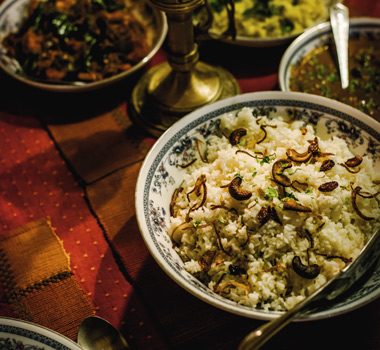
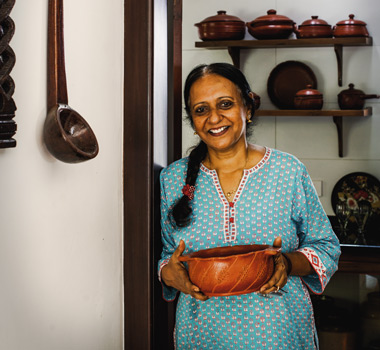
Nimmy Paul is our next host in the Fort Kochi region of India’s original international and multi-ethnic city, Kochi. In a kitchen surrounded by traditional Keralan cooking vessels and implements, Nimmy enthralls us with stories of food and culture from her Syrian Christian community.
Comprising around 20 percent of Kerala’s population, Syrian Christians can trace their origins back to the evangelistic activities of Thomas the Apostle in the first century, and their connection is not to Syria ethnically, but a historical and religious tie to Syrian Christianity.
A self-declared “mistress” of South Indian cuisine, Nimmy has been sharing the traditional recipes of her mother and grandmother with tourists for over 22 years now.
“I was the youngest of eight and very attached to my mother, so I spent a lot of time with her in the kitchen. She didn’t teach me the recipes, I just observed her,” she says.
Syrian Christian cuisine is milder in flavour and heat than typical Keralan food. There’s a refined lightness to the cooking that Nimmy takes to another level. We sit down to small plates of a fragrant prawn ularthiyathu, served with a small conical dosa, followed by a dry coconut goat curry known as varathu arachathu. The spices in both dishes are subtle and balanced, far from the fiery curries many of us associate with South India.
Wandering around Nimmy’s garden after lunch, we marvel at the huge mango and jackfruit trees, before bidding our farewells. For once, I leave somewhere in South India thinking I may have room for dinner!